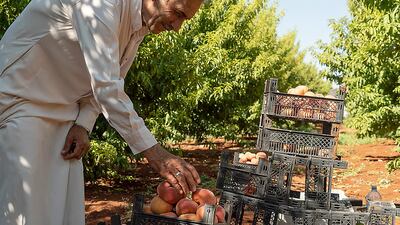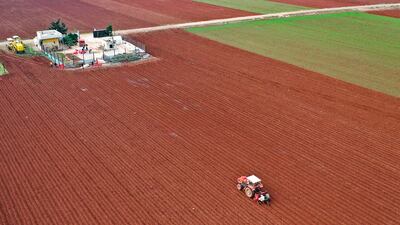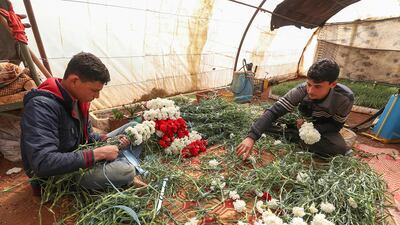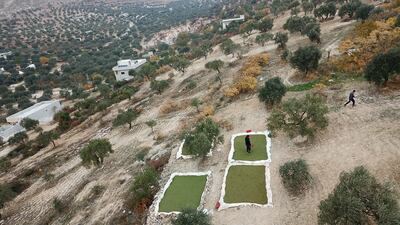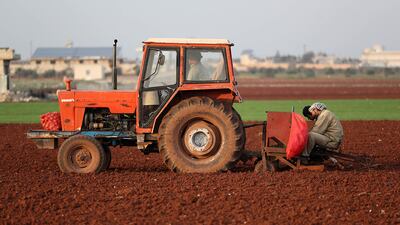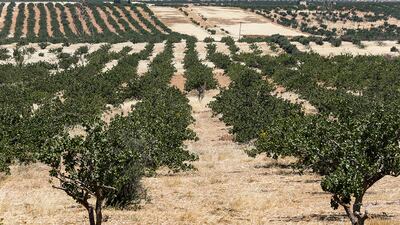With just a month to go until wheat-harvesting season, Hussam and his 25 relatives had to flee their tiny village in Syria's central Hama governorate, leaving behind the 2.5 hectares of lush farmland that had sustained them for decades.
Three years later, the 43 year-old went from living comfortably to struggling just to feed his five kids in a refugee camp on the border with Turkey in the northern opposition-controlled city of Haram. From farming vegetables, wheat and cotton for wholesale, Hussam now survives on handouts.
"Here I knew hunger," Hussam, who asked to go by his first name for security reasons, told The National. "Sometimes we eat, sometimes we don't. Most of our homes were destroyed after years of almost daily bombardment.''
Since the landowners escaped airstrikes and a regime-led campaign of attacks on Sahl Al Ghab, the fertile grounds have become a source of revenue for supporters of Syrian President Bashar Al Assad’s regime.









Unauthorised civil unions and government-appointed security committees in Hama are colluding in the illegal “investment” of plots whose owners – like Hussam - have fled bombing, shelling and daily attacks.
Through rigged auctions, the rights to cultivate and benefit from these abandoned spaces are granted to a small circle of bidders handpicked by pro-government loyalists.
"It's not ours anymore," landowner and a lawyer-turned-activist Abdulnasser Hoshan, 52, told The National.
For over 70 years, Mr Hoshan’s family also built their lives on Hama’s fertile soil – in the heart of Syria’s pistachio-farming industry. No longer a family heirloom, his land is going to the highest regime-backed bidder.
“Once it has fallen into the hands of the regime, documents proving ownership are worthless in the face of the sweeping seizures,” he said. “Only a handful of merchants are allowed to bid on the land. They back pro-regime militia fighting on behalf of the government.”
He and 30,000 others from the now-decimated town of Kafr Zita fled for safety after multiple offensives, including a 2014 chlorine gas attack, ended with the regime's successful takeover in 2019.
“Ancestors from whom we had inherited our land are all publicly listed as owners of lands to be invested through auctions,” he said.

Mr Hoshan left 10 hectares behind.
Government-issued legislative decrees “legitimising” these measures, even though they contravene with constitutional property protection laws prohibiting the stripping of ownership if it fails to serve “greater good” without just compensation to the original owner.


“While ownership is not being ‘stripped’ in a formal sense – the act of cultivating someone else’s land, especially when there’s a threat over reclaiming it, is equivalent to looting,” Mr Hoshan said.
Although the property deed itself is not impacted, rights associated with ownership like cultivation of land by their true owners and leasing it are severely limited.
Rights groups say the measures are tantamount to property seizure.
"The regime effectively takes these lands and distributes them to security forces and militia members to compensate them for the work they're doing on the regime's behalf because the money paid to them is not enough," Syrian Network for Human Rights head Fadel Abdul Ghany told The National.
This includes 44,000 hectares of agricultural land in regime-held Hama and parts of Idlib, the Syrian network said in a report.
Forcibly displaced people living in opposition territories also face grave risks if they choose to return, including, but not limited to, imprisonment, according to international rights agencies.
Human Rights Watch (HRW) has warned other NGOs against offering support to farmers on this “stolen land”.
“This is not the first time that Syrian authorities have used laws and policies to punish people they perceive to be opposing their brutal rule,” HRW Syria researcher Sara Kayyali said.
"We have never seen justification for this in writing," she told The National.
Mr Hoshan says that is because there isn’t a legal backing to these measures or the mechanism through which the bidding takes place.
“The unofficial, informal, and non-governmental Peasants’ Union says the auctions are held on behalf of the state-owned Agricultural Cooperative Bank,” he said.
The Peasants’ Union and the Syrian Agricultural Cooperative Bank couldn't be reached for comment.
Some of the de-facto expropriation is labelled “asset seizure” without providing evidence of farmers’ debts outstanding.
“The union cannot confiscate anyone’s assets, nor can the bank authorise them to do so," said Mr Hoshan, the lawyer. "Those who have their assets held also need to be notified before that happens – which is not being done here.”
In the northern fringes of Idlib, journalist Iyad Abd Al Jawad, 37, and his family also live in a refugee camp. They fled their home in 2015.

Two years ago, Mr Jawad climbed a hill close to his old 2.4-hectare farmland in his village of Qaber Fidda. He shot a photo that clearly showed his land is now being farmed and cultivated by unknown hands.
“We grew wheat, barley and beans in the winter and cotton, beets and vegetables in the summer," he said. "We lost everything.”
